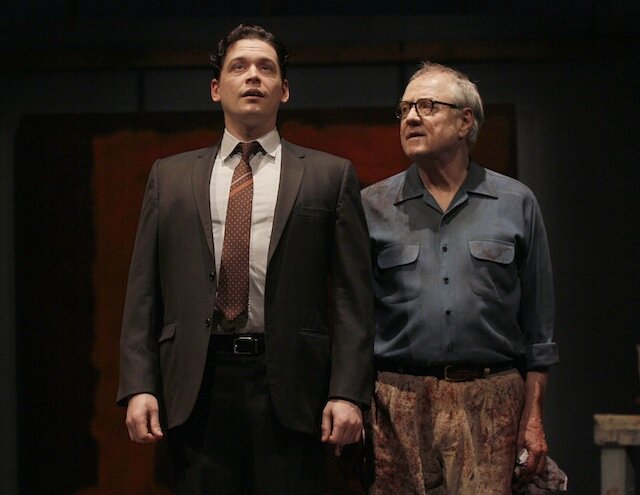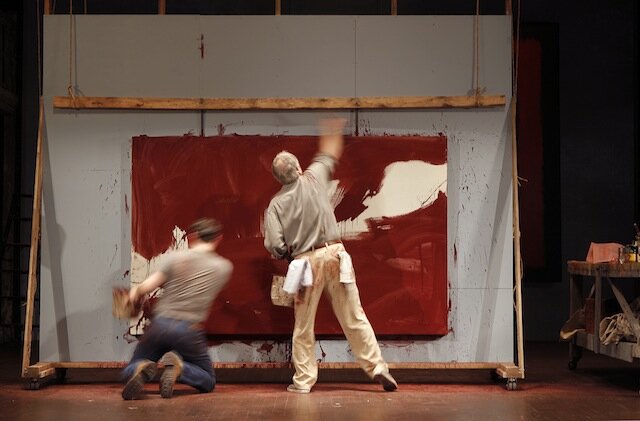John Logan‘s play RED (at Seattle Rep through March 24), about the painter Mark Rothko, won the 2010 Tony, Drama Desk, Drama League, and Outer Critics Circle awards. (You may also remember Logan from his screenplays for such movies as Hugo, The Aviator, and Gladiator.) Here in Seattle, the Rep has already extended its run.
It’s a talky two-hander, starring Denis Arndt as Rothko and Connor Toms as his atelier assistant Ken…and Kent Dorsey’s moveable feast of a set. Brendan Patrick Hogan serves up the warring soundscape, classical vs. jazz, that underscores the generational conflict onstage.
None of this can truly disguise the fact that, over the following 90 minutes, nothing really happens, or, to put a finer point on it, nothing surprising happens. RED is a way of talking out ideas about art and ambition, rather than dramatizing them. There’s a lot more telling going on than showing.
The play begins with self-confessed dinosaur Rothko “welcoming” Ken to the studio with an acid, irascible monologue that makes it clear he expects Ken to be little more than an extra set of helping hands, even though he is also, it turns out, congenitally incapable of not lecturing on art as well. Arndt may look diminutive on the Rep’s expanse of stage, but, as Rothko, his invented stature will tower over it all. Director Richard E.T. White has Arndt face the audience as if he’s surveying a painting in progress, but it also comes to seem as if all there is is Rothko, the world, and his appraisal of it.
As Ken, Connor Toms gets the literally thankless task (until the bows) of standing in for the audience, our supplication and ignorance and desire for the great man’s attention; and while Ken will come to forge a different relationship with Rothko in time, it’s also true that when, in an angry outburst, he challenges Rothko that the painter knows nothing about him personally, neither does the audience, really. Other than a hasty phone call, Logan hasn’t bothered to show us Ken existing outside of Rothko. Toms does what he can with Ken’s angry young man, but beyond the recounting of a childhood trauma, the character is a sort of Oedipal dress-up doll, wearing 1958 fashions.
On the one hand, Logan succeeds, nearly, in carrying it all off for the hour and a half. It’s not that long, and there’s enough repartée, in addition to what is proposed to be serious talk about art, that you don’t squirm from boredom. Arndt’s Rothko is an appealing, appalling monstre sacré, an avuncular narcissist, aristocratic bohemian, effortlessly condescending auditor (Ken is right, he admits at one point, but not–judo flip!–about the point he was trying to make.)
You learn something, in broad strokes, about Rothko’s project with his field paintings, complete with keyword variations (pulse, pulsing, pulsation). There’s Rothko’s evolving relationship with death, and what he can rely on art to accomplish. More subtly, in watching Ken, you get to see frames constructed, canvases applied–it’s like a slow-motion montage. (Inexplicably, after the scene where Rothko and Ken quickly swab a background onto a canvas, the audience burst into applause. I say, inexplicably, but maybe it was just the thrill of seeing real paint applied to real canvas, live.)
On the other hand, the imagined conversations can stray too far toward late-night dorm room philosophizing; angry young men are a pain, and so are didactic old fogeys; and listening to a painter talk about his or her work is often insufferable. If they’re that articulate, why paint? Logan’s Rothko is better on the transferable properties of art–where Logan can speak feelingly from behind Rothko’s mask–than on Rothko’s painting per se, where Rothko can sound too much like a curatorial appreciation.
I’m not sure I understand the extent of the critical plaudits lavished on RED, but it does, clearly, speak to the patrons of a house like Seattle Rep, and why not. One of the most poignant things about the play was how Rep playgoers were so clearly in this urbane, accomplished, begrudgingly aging Rothko’s corner, erupting with laughter and applause as he scored again and again off the brash, “needy,” idealistic Ken. Logan’s play, as much as it seems to hum “There is a season, turn, turn, turn,” under its breath, celebrates Rothko as a man who’s made it, who can say “Fuck you” if he feels like it. If death is creeping into the frame from all sides, the pulse is still strong.




